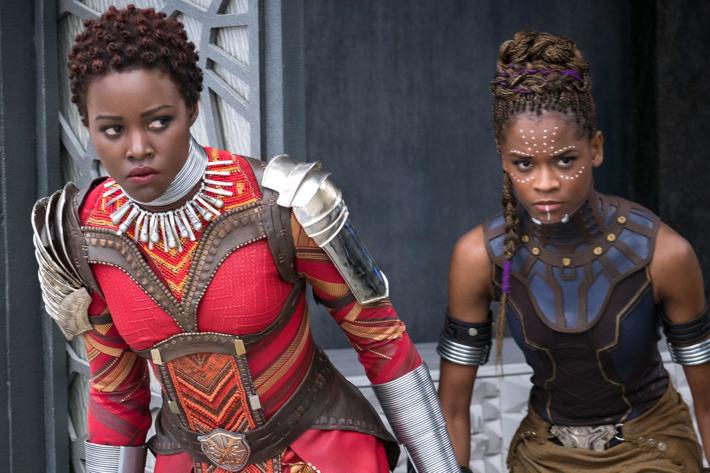Marvel’s “Black Panther” doesn’t get lost in the endless abyss of cliche superhero movies. It does more than entertain with death-defying action, it persuades the viewer to be a part of a political revolution. Along with starring the first black superhero in the comic book world and having a predominately African-American cast, “Black Panther” packs a progressive punch; just what Hollywood needs.
The world believes Wakanda, Marvels’ fictional African country and the main setting of the film, is a place riddled with poverty and limited resources; a Third World country. Unbeknownst to the rest of the world, Wakanda is the opposite and has a seemingly endless stream of technological innovations. The country has characteristics of a utopian society, with influences of Afrofuturism; a term coined in 1994 by academic Mark Dery in his essay, “Black to the Future.”
“Afrofuturism combines elements of science fiction, historical fiction, speculative fiction, fantasy, Afrocentricity, and magic realism with non-western beliefs,” said author Ytasha Womack.
While celebrating the beauty and strength of African culture the director, Ryan Coogler, gives the viewers a great visual representation of this term. The ceremony held for T’Challa’s (Chadwick Boseman) impending kingship mirrored a vibrant painting coming to life by paying homage to traditional African wardrobe, tattoos and dance.
“Black Panther’s” cinematic qualities and musical feats are important to the film’s record-breaking success; however, its societal impact is powerful.
The film indirectly addresses some of America’s political hot topics such as immigration, refugee assistance and the unfair advantages certain people have over others. Nikta (Lupita Nyong’o), is the main advocate for Wakanda sharing their advanced resources and technological intelligence with those struggling around the world. Her thoughts and beliefs reflect the people of today, mainly minorities, who are fighting for an equal playing field and opportunities towards success.
In fact, the backstory of main antagonist Erik Killmonger (Michael B. Jordan) mirrors the relatable conditions of people of all ages across urban centers of America. Killmonger grew up in Oakland and holds great animosity for Wakanda’s lack of action to share the technological advancements with their American bred brothers and sisters; especially since he is half Wakandan himself. The murder of his father, N’Jobu former prince of Wakanda, only further ignites his hatred towards the country, and more specifically, his cousin T’Challa.
Killmonger finally gets the chance to stand before Wakandan royalty, but he has to prove he isn’t an imposter and folds his lower lip down, showing a tattoo only true Wakandans possess. Despite the inked proof, queen Ramonda (Angela Bassett) denies his Wakandan blood and does not want an “outsider” in the country, much less battle her son for the throne. Ramonda is not the only one that holds this mindset; several Wakandans hold this value, and this is part of the reason they have not shared their inspiring advancements with the world. Opinions like this have been around since the beginning of time and continue today with the treatment immigrants face.
Once the battle ensues the connections between the American Revolutionary War are uncanny. The opposing Wakandan sides are wearing red and blue, not only the colors of the British and Americans during the war but also the colors of Republicans and Democrats today.
Similar to the start of nearly all battles, Killmonger and T’Challa have differing opinions for the future of Wakanda. Kimonger wants to use the country’s advanced weapons to supply revolutionists all over the world and inspire them to overthrow their oppressors, sometimes referred to as colonists, while T’Challa wants to give aid, teach and inspire those with Wakanda’s knowledge.
Of course T’Challa prevails, but victory isn’t the main feeling elicited in the final scene; it’s hope for a better future for children across the world, with the assistance of Wakanda’s intelligence resources.
Pan to Oakland and the same makeshift basketball court Killmonger played on as a kid; not much has changed. However, T’Challa plans to revolutionize the area with Wakandan technology and knowledge in honor of his late cousin Killmonger.
Then “a Bugatti spaceship,” as said by one of the kids, mesmerizes the kids as it lands on the court, but one makes eye contact with T’Challa and asks if the ship is his. Even though that question goes unanswered, the viewer sees a heart-warming exchange as the Black Panther encourages and inspires these boys, maybe for the first time in their lives, to be something other than what society tells them.



































